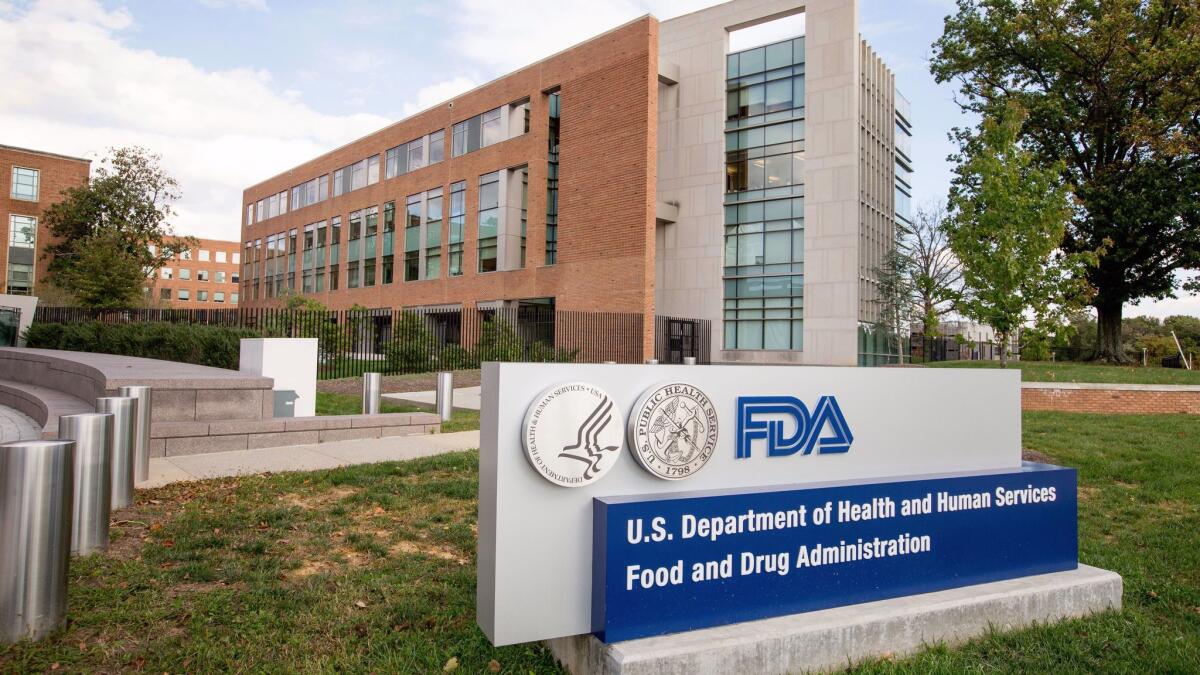FDA’s program to speed up drug approval shaved nearly a year off the process

- Share via
Speeding the pace at which potentially lifesaving drugs are brought to market was a rallying cry for Donald Trump as a candidate, and is a stated priority of his Food and Drug Administration commissioner, Dr. Scott Gottlieb. But a new study finds that programs already in place were routinely shortening the drug development process by close to a year, and sometimes much more.
Shorter drug-development timelines hold the promise of getting new medications to suffering patients more quickly. But when it comes to getting a drug candidate through clinical trials and FDA review, time is also money. Faster approval means drug companies can begin profiting more quickly from their discoveries. And that may (or may not, according to whom you talk to) result in lower drug prices.
In a Research Letter published Tuesday in the journal JAMA, a trio of health economists from Brigham and Women’s Hospital in Boston set out to test whether and how four FDA programs shortened the length time it took for proposed prescription drugs to get from their earliest clinical trials to market approval.
Of 174 drugs and biologic therapies approved between January 2012 and December 2016, 105 (or 60%) traversed the FDA evaluation process with one of four designations aimed at speeding the path to approval. The 69 candidate medications that had no such hurry-up designations took between 6.5 and 10 years to proceed from the start of human trials to FDA approval, with a midpoint of eight years.
Candidate medications evaluated under one of the four accelerated programs took between 5.1 and 10.1 years to cover the same ground, with a midpoint of 7.1 years.
Those faster speeds were largely attributable to two programs.
One, instituted in 2012, compresses clinical trials, dedicates FDA personnel to provide advice, and streamlines the FDA evaluation process for experimental drugs that may provide “breakthrough” therapy for a disease. Half of the drug candidates that got the breakthrough designation sprinted from the start of human clinical trials to FDA approval in 4.8 years or less, compared with a median start-to-finish time of eight years for drug candidates with no expedited designation.
The second, a 1997 “fast track” program, offers similar but less extensive benefits to speed drug development and evaluation time. For drug candidates that were designated for fast-tracking, the program carved about a year off the median drug development time.
Two 1992 programs designed to speed the FDA’s review of drug candidates did not shorten the time it took for a drug to get from the start of human clinical trials to approval, the study found. One was the Accelerated Approval program, which allows the FDA to consider clinical trials that measure a drug’s indirect effects on disease. The other was the Priority Review program, which limits the time period in which the FDA evaluates a candidate drug for approval.
UC San Francisco health economist Dr. Adams Dudley said the new research underscores that when it comes to shortening drug-development times, one key factor appears to make a difference: intensive attention from FDA evaluators. And providing that takes a commitment to staffing an agency whose budget is currently clouded in uncertainty.
The Trump administration has proposed to slash FDA funding by $854 million in 2018, but recoup that loss with revenues from drug and medical device makers who pay fees to have their products evaluated. That proposal has hit head winds in Congress.
The likely result: With growing backlogs of generic and new drugs to be evaluated, the FDA may see personnel cuts, not an expansion.
“We’ve constantly cut the budget and reduced personnel costs at FDA, and this research suggests it might help to get more people there,” said Dudley, who directs UCSF’s Center for Healthcare Value.
If giving drug candidates a speedier path through the FDA is a priority, staffing the agency for the more labor intensive task will have to come first, said Dudley.
“It’s just a choice we make as a society,” Dudley added. “Is it worth it to hire people who are good at testing drugs and deciding whether they work, or is it something we don’t want to pay for?”
MORE IN SCIENCE
Early-life stress, especially in war, can have consequences across multiple generations
More than half of U.S. kids will be obese by the time they’re 35, study predicts







